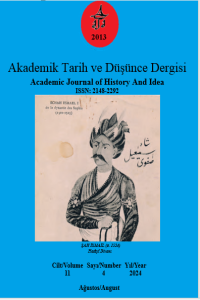Öz
Bu makale, din felsefesinin kurucusu olan Hegel’in bu felsefi disiplin ile neyi amaçladığını, nasıl bir sınırlama getirdiğini, hangi konuları din felsefesine dahil ettiğini veya dışarda bıraktığını araştırmak amacıyla yazılmıştır. Hegel, din felsefesine Tanrı düşüncesinin analiziyle başlar. Ona göre tanrı, felsefenin nihai amacıdır. Yine Hegel’e göre felsefenin hakikate doğru hareketinde üç aşama vardır: Birincisi, mantıksal ya da saf düşünce aşaması; ikincisi, doğa; üçüncüsü, sonlu ruh. Sonlu ruhtan felsefenin nihai sonucu olan tanrı’ya doğru ilerleriz. Tanrı, mutlak gerçektir ve sonuçtur ama aynı zamanda ilk olmaktadır. Tanrı, Hegel’in din felsefesinde tüm düşüncesinin hem ön kabulü hem de amacıdır. Tanrı’nın akıl yoluyla elde edilen bilgisi felsefenin en önemli ve değerli meselesidir. Hegel felsefesinde Tanrı, kendini koşullandıran, ben-merkezli, var olan her şeyin bütünlüğü, yani nihai birliktir. Felsefe, Tanrı’nın nihai birlik olduğuna dair çıplak bir iddiayla yetinmemeli, bu birliği belirlemeli ve onu somut bir sistem olarak ortaya koymalıdır. Hegel’in sistemi incelendiğinde, bu sistemin farklı bölümleri Tanrı’nın varlığının farklı delillerini ifşa etmektedirler. Düşünür, felsefeye Tanrı’nın somutlaştırılması ve açık, belirgin kılınması görevini verir. Hegel için hakikat, düşüncenin dış gerçeklikle uyuşması değildir. Hegel, düşüncenin nesnel geçerliliğini belirleme girişimiyle ilgilenmez ve bunu tamamen sonuçsuz bir girişim olarak kabul eder.
Anahtar Kelimeler
Kaynakça
- Hegel, G. W. F. (2011). Tinin Görüngübilimi (Çev. A. Yardımlı). (3. b). İdea Yayınları.
- Hegel, G. W. F. (2014). Felsefi Propedeutik (Çev. A. Yardımlı). İdea Yayınları.
- Hegel, G. W. F. (2016). Din Felsefesi Dersleri (Çev. D. Naci Kadıoğlu). Pinhan Yayınları.
- Hegel, G. W. F. (2016). Tanrı’nın Varoluşunun Tanıtları Üzerine Dersler (Çev. A. Yardımlı). İdea Yayınları.
- Hyppolite, J. (2013). Mantık ve Varoluş, (Çev. İ. Yılmaz- C. Gürbüz). Bilgesu Yayıncılık.
- Pinkard, T. (2012). Hegel (Çev. M. Barış Albayrak). Türkiye İş Bankası Yayınları.
- Singer, P. (2003). Hegel (Çev. B. Öcal Düzgören). Altın Kitaplar Yayınları.
- Soldan, F. L. (1886). Hegel’s Philosophy of Religion. The Journal of Speculative Philosophy, 20 (3), 301-309.
- Stewart, J. (2020). Hegel's Philosophy of Religion as a Phenomenology. Filozofia, 75 (5).
- Wood, A. (2018). Kant (Çev. A. Kovanlıkaya). Alfa yayınları.
Öz
This article is written in order to investigate what Hegel, the founder of the philosophy of religion, aimed at with this philosophical discipline, what kind of limitations he imposed, and which subjects he included or excluded from the philosophy of religion. Hegel begins his philosophy of religion with an analysis of the idea of God. According to him, God is the ultimate goal of philosophy. Again, according to Hegel, there are three stages in the movement of philosophy towards truth: First, the logical or pure thought stage; second, nature; third, finite spirit. From the finite spirit we move towards God, the ultimate result of philosophy. God is the absolute truth and the result, but at the same time the first. In Hegel's philosophy of religion, God is both the presupposition and the goal of all thought. The knowledge of God obtained through reason is the most important and valuable issue of philosophy. In Hegel's philosophy, God is self-conditioning, self-centred, the totality of everything that exists, that is, the ultimate unity. Philosophy should not be content with a bare assertion that God is the ultimate unity, but should determine this unity and present it as a concrete system. When Hegel's system is analysed, the different parts of this system reveal different proofs of God's existence. The thinker assigns to philosophy the task of concretising God and making Him clear and distinct. For Hegel, truth is not the correspondence of thought with external reality. Hegel is not interested in the attempt to determine the objective validity of thought and regards it as a completely fruitless endeavour.
Anahtar Kelimeler
Kaynakça
- Hegel, G. W. F. (2011). Tinin Görüngübilimi (Çev. A. Yardımlı). (3. b). İdea Yayınları.
- Hegel, G. W. F. (2014). Felsefi Propedeutik (Çev. A. Yardımlı). İdea Yayınları.
- Hegel, G. W. F. (2016). Din Felsefesi Dersleri (Çev. D. Naci Kadıoğlu). Pinhan Yayınları.
- Hegel, G. W. F. (2016). Tanrı’nın Varoluşunun Tanıtları Üzerine Dersler (Çev. A. Yardımlı). İdea Yayınları.
- Hyppolite, J. (2013). Mantık ve Varoluş, (Çev. İ. Yılmaz- C. Gürbüz). Bilgesu Yayıncılık.
- Pinkard, T. (2012). Hegel (Çev. M. Barış Albayrak). Türkiye İş Bankası Yayınları.
- Singer, P. (2003). Hegel (Çev. B. Öcal Düzgören). Altın Kitaplar Yayınları.
- Soldan, F. L. (1886). Hegel’s Philosophy of Religion. The Journal of Speculative Philosophy, 20 (3), 301-309.
- Stewart, J. (2020). Hegel's Philosophy of Religion as a Phenomenology. Filozofia, 75 (5).
- Wood, A. (2018). Kant (Çev. A. Kovanlıkaya). Alfa yayınları.
Ayrıntılar
| Birincil Dil | Türkçe |
|---|---|
| Konular | Din Felsefesi |
| Bölüm | Makaleler |
| Yazarlar | |
| Erken Görünüm Tarihi | 3 Eylül 2024 |
| Yayımlanma Tarihi | 22 Eylül 2024 |
| Gönderilme Tarihi | 30 Temmuz 2024 |
| Kabul Tarihi | 3 Eylül 2024 |
| Yayımlandığı Sayı | Yıl 2024 Cilt: 11 Sayı: 4 |
По всем вопросам приема статей и выпуска очередных номеров обращаться в редакцию соответствующего журнала


